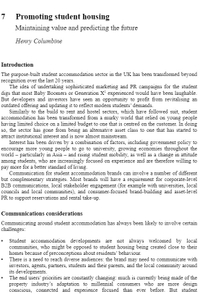Henry Columbine (Newgate Communications) is the author of STUDENT HOUSING: Maintaining value and predicting the future
STUDENT HOUSING
The Chapter
Student accommodation is changing rapidly. With higher prices, increased competition among developers and from institutional investors entering the fray, communications requirements in this sector have gone from non-existent to significant. Communicating to potential residents offers opportunities for creativity but also requires care. Choosing a suitable tone for audiences, whose values and priorities are changing constantly, is not always straightforward. This chapter illustrates the importance of the research vital in understanding how messaging will be perceived and campaigns planned and executed.
The Author
Henry is a managing partner of Newgate Communications. He has 12 years’ experience in strategic communications, with a focus on the property sector. His work includes corporate campaigns for real estate developers, investors and consultants, as well as supporting sales and lettings programmes for commercial, residential and mixed-use schemes.
An interview with the author
What is you background and your experience of student accommodation?
With a background in writing and editorial work, I specialise in strategic communications to build brands through well-considered language and messaging. My first comms role was in financial PR, before I chose to focus on the real estate sector, where I subsequently gained experience across corporate and consumer campaigns. As well as working with student accommodation developers and investors, I have worked on almost all subsectors within the property world, from offices to logistics, retail to residential, hostels to hospitals.
Why did you choose this career?
It brings together two passions: language and property. As a self-confessed grammar nerd who studied languages at university, taught English overseas and developed content for language-learning software, the writing side of a career in communications appealed to my academic side. Meanwhile, as someone who spends their holidays dragging their family to see unusual buildings, the subject matter of my job perfectly suits my interest in design and architecture.
What benefit do you feel the book will bring?
I’ve always felt that my career is somewhat niche. I hope the book will help increase understanding of what a career in communications within the built environment sector is all about, encouraging more young people to consider it as a career option and providing some further reading for when I’m trying to explain to people what I do!
How does the property industry benefit from PR?
The property sector has more requirement for communications than perhaps any other: as well as corporate stories to tell and funds to raise from investors, there are homes to sell and commercial properties to let, not to mention local residents and stakeholders to appease.
What would you say are the key principles of good property PR?
The principles of good PR in the property sector are much the same as in any other sector: know what you’re trying to achieve, identify who you want to talk to, develop language and messaging that will resonate with those audiences, consider which channels you’re going to use to reach them, and communicate clearly and regularly in good times and in bad.
What are the key issues that property PR faces?
As well as several immediate practical issues facing the sector – improvements in technology affecting how much we need (though perhaps not how much we want) to leave our homes; Brexit and political issues affecting investment from overseas; and the coronavirus pandemic’s impact on the economy – the industry faces perhaps an even bigger challenge in terms of its overall reputation. Property affects us all – we all need places to live, work, go to school and spend our leisure time – and it can be an exceptionally emotive subject. We all feel ownership of our local communities and might be fiercely protective of them. Some developers have, in the past, perhaps not been conscious or considerate enough of local community sentiment. In spite of Section 106 contributions and an increased focus on ESG, ill-thought-through language and messaging, opacity around councils’ deals with developers and a lack of diversity within the industry have all contributed to a distrust of developers and a them-and-us mentality. Communications has a significant role to play in helping ensure the public sees the benefits that the property industry can bring to their local area.
How is PR for student housing changing?
The way people interact with brands and with the media is changing significantly. As fewer people read the newspapers, more people turn to social media and news is more likely to be delivered by varied sources than trusted organisations. In this context, there is an increased role for influencers, podcasts and branded social media content, particularly where younger audiences are being targeted, such as in the student accommodation sector. Yet, while the channels are changing, the principles remain the same: the need to consider the audience, develop compelling messaging and create thought-provoking content remain the cornerstones of a successful campaign.
What are the key learning points that are communicated in your chapter?
The student accommodation sector is a dynamic one where the evolution from being an alternative asset class to a more mainstream one with more competition is starting to present new challenges. There are varied communications requirements and significant room for creativity, but the key – as ever – is to understand the audience. With student accommodation being most people’s first interaction with the property industry, research can play a vital role in ensuring campaigns speak to a new intake that might have different values and priorities than those who came before them.

